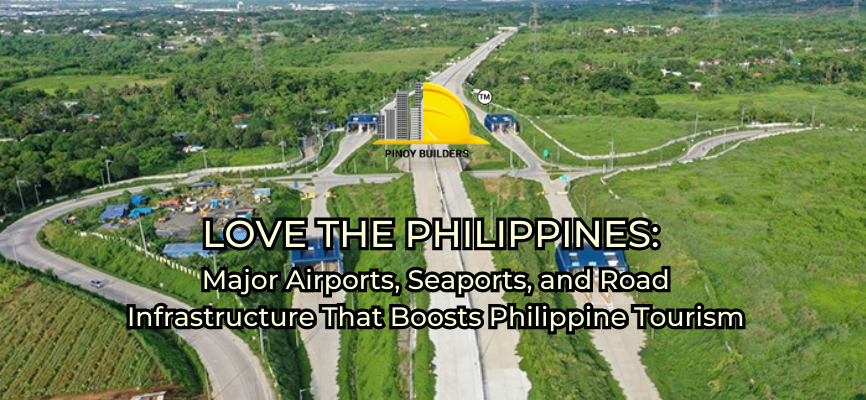Travel infrastructure is very important in the success of a country’s tourism industry. In the Philippines, the current administration has expressed its clear desire to drastically increase the influx of visitors and foreign investors to help boost local tourism. With the country’s breathtaking landscapes, rich cultural heritage, and notable proficiency in the English language, the Philippines is no doubt one of the world’s most popular destinations for travelers from all around the globe.
To support the growth of the Philippines’ tourism industry, the current administration promises to support its growth by prioritizing infrastructure projects such as airports, seaports, and major road infrastructure. In this article, we will explore some of the most important infrastructure that the current government sees as beneficial to boost local tourism and economy, and spark foreign visitors to love the Philippines.
Ninoy Aquino International Airport Rehabilitation With MIAC New Super Consortium
One of the most recent updates from the current government’s Build, Better, More program is the potential privatization of NAIA’s premises, which is meant to improve the airport’s services and operations.
According to an ANC interview with the MIAC representatives last June 20, they have offered the NAIA terminal administration a proposal of a 25-year consortium meant to efficiently revitalize the services and operations of the infrastructure and ultimately support the increase of tourists entering the country and contribute to the economy.
As a major infrastructure, NAIA serves as one of the main gateways leading into the country. If the government approves the 25-year consortium, the airport will receive a much-needed rehabilitation that is bound to improve and streamline the operation of NAIA. If this project pushes through, the MIAC expects the Ninoy Aquino International Airport to be one of the best airports in the Southeast Asian region, and compete with other highly praised international airports.
Railway Projects
In one of his main agendas for his current term, President Ferdinand Marcos Jr. emphasized his desire to not only continue former President Rodrigo Duterte’s Build, Build, Build infrastructure program, but also to expand the previous plans to greater lengths.
In his first State of the Nation address, Marcos included various railway projects in his Build, Better, More program, aiming to revitalize and improve the country’s railway infrastructures that will not only benefit local tourism but also the local economy. Included in the railway infrastructure projects of the current government’s Build, Better, More program are the following:
LRT-1 Cavite Extension
This railway project will expand the current LRT-1 from 20 stations to 28. The railway will add 11 kilometers to the existing LRT-1 and run from major Philippine cities like Quezon City, Caloocan, and Manila, all the way to Bacoor, Cavite. According to the Philippine News Agency, the project is on track to be completed by 2024.

Image from GMA News
MRT-7
Currently in construction, the MRT-7 is a railway infrastructure project under the SMC Corporation. Halted for right-of-way-issues during the late 2010s, the infrastructure project has reached 66% completion after the first month of the year.

Image from San Miguel Corporation
Expressway Extensions
Many projects under the current administration’s Build, Better, More program includes the extension of existing highways in order to improve the connections from region to region. In addition to this, expressway extensions also open up more provinces in the country that allows foreign visitors to have easier access to many other locations of the Philippines that would be challenging to reach otherwise. The improvement of goods and services transportation is also expected to improve from the extension of expressways. Below are some of the Philippine highway extension projects currently under construction.
Cavite-Laguna Expressway

Image from BusinessMirror
Signed as E3 of the Philippine Expressway Network, the Cavite-Laguna Expressway is a 66.43-kilometer expressway designed to connect the Manila-Cavite Expressway to South Luzon Expressway.
Central Luzon Link Expressway

Image from BusinessWorldOnline
Partially operational, the Central Luzin Link Expressway is a 66.4-kilometer expressway that will connect SCTEX and TPLEX to the North Luzon Expressway in Cabanatuan. The North Luzon Expressway is also currently under construction.
Metro Cebu Expressway

Image from SunStar
The Metro Cebu expressway will be a 74-kilometer that will connect the Cebu North Road to the Naga–Uling Road in Naga.
Explore The Country, Love The Philippines
The Philippines is a popular tourist destination for people who want to experience not only the beauty of nature that can only be found in the country but also experience the unique Filipino culture that can’t be replicated anywhere else. In recent years, especially after closing international ports due to the pandemic, the Philippines is once again putting a spotlight on its tourism industry, with solid plans of revitalizing it once more and improving the experience of both local and international tourists.
Apart from the newest slogan “Love The Philippines” released by the Department of Tourism, there are much more improvements to be anticipated by the country’s international tourists. The current administration’s goal of improving the country’s infrastructure sector is set to help enhance the experience of the tourists who will visit the country, but these projects are also bound to improve the connections between local regions and help the economy grow. With most of these infrastructures set to be completed within Marcos’ term, the Philippines’ tourism industry is due for a significant resurgence.
References:
- Ong, G., Flores, H. (28 June 2023) Philippines rebranded to boost tourism. The Philippine Star. Retrieved from: https://www.philstar.com/headlines/2023/06/28/2277080/philippines-rebranded-boost-tourism
- Lightrail Manila Corporation (n.d) LRT-1 Cavite Extension Project. Retrieved from: https://lrmc.ph/lrt-1-cavite-extension-project/
- Wikipedia (n.d.) MRT Line 7. Retrieved from: https://en.wikipedia.org/wiki/MRT_Line_7
- Parrocha, A. (25 July 2022) PBBM wants to ‘Build Better More’ with focus on railway systems. Philippine News Agency. Retrieved from: https://www.pna.gov.ph/articles/1179704
- Patinio, P. (22 December 2022) C. Luzon expressway extension to open in first half of 2023. Philippine News Agency. Retrieved from: https://www.pna.gov.ph/articles/1191302
- Wikipedia (n.d.) Central Luzon Link Expressway. Retrieved from: https://en.wikipedia.org/wiki/Central_Luzon_Link_Expressway
- Wikipedia (n.d.) Cavite–Laguna Expressway. Retrieved from: https://en.wikipedia.org/wiki/Cavite%E2%80%93Laguna_Expressway










